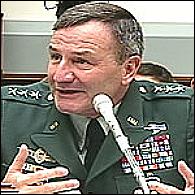2007年VOA标准英语-US Officials Urge Pakistan To Help Fight Taleba(在线收听)
Capitol Hill
14 February 2007
U.S. defense and military officials have told Congress Pakistan needs to do more to eliminate Taleban insurgents along the border with Afghanistan. Their testimony on Capitol Hill Tuesday follows recent talks Defense Secretary Robert Gates had in Pakistan with President Pervez Musharraf. VOA's Dan Robinson reports.
 |
| Lieutenant General Karl Eikenberry (file photo) |
However, he says a combination of what he calls a "comprehensive counter-insurgency approach" by Pakistan and a steady direct attack against Taleban command and control centers is essential at this stage.
General Eikenberry says that the Taleban continue to use Waziristan, along the Afghan-Pakistan border, as well as territory deeper inside Pakistan to direct attacks inside Afghanistan:
"We are still left with areas right now in Waziristan, and areas inside of Pakistan, where our strong belief is that mid-level, and especially senior level command and control of the Taleban and al-Qaida is," said General Eikenberry.
The general says U.S. and NATO forces are "well-positioned" to deal with an upsurge of Taleban violence this spring. Other officials at the hearing also touched on the problem.
Noting that President Musharraf faces a sensitive political situation at home, defense department official Mary Beth Long is quite specific as to steps the U.S. is looking for:
"Border arrangements along the east, and in particular in northern Waziristan, need to be tightened and increased," said Mary Beth Long. "I think you have heard both Afghan and Pakistani leaders talk about sealing the borders. In Quetta, we are terribly concerned regarding Taleban and other leadership that are in Baluchistan and other tribal areas who continue to manage and direct Taleban and al-Qaida activities. Activities against those will be needed.
Of the 27,000 U.S. troops in Afghanistan, about 16,000 are under the command of NATO.
But while NATO has assumed command of 25 Provincial Reconstruction Teams (PRT), lawmakers are concerned that NATO is still not doing as much as it can.
Ike Skelton is the Democratic chairman of the House Armed Services Committee:
"Our NATO partners must seriously step up their efforts, fulfilling their obligation on both troops and freeing their forces from restrictions that limit their ability to fight," said Ike Skelton.
In his testimony, John Gastright, the Afghanistan coordinator in the State Department, echoed the concern expressed by lawmakers:
"NATO needs to meet the requirements it set when taking on the mission in Afghanistan, and drop the caveats that hamper our cooperation and effectiveness and supply the forces that commanders need to succeed in their efforts," he said.
The officials appealed to lawmakers to approve $5.9 billion in a supplemental spending request to the 2007 budget and another $2.7 billion for 2008. They say the money is needed for equipment and other needs of Afghanistan's national army and police.
General Eikenberry says this will allow the Afghan army to expand to 70,000 and police to 82,000 by the end of 2008. The expansion, he says will give Afghan forces the means to meet threats from insurgents.